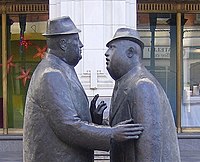
Photo from wikipedia
Theoretical and experimental investigations have consistently demonstrated that collective performance in a variety of tasks can be significantly improved by allowing communication. We present the results of the first experiment… Click to show full abstract
Theoretical and experimental investigations have consistently demonstrated that collective performance in a variety of tasks can be significantly improved by allowing communication. We present the results of the first experiment systematically investigating the value of communication in networked consensus. The goal of all tasks in our experiments is for subjects to reach global consensus, even though nodes can only observe choices of their immediate neighbors. Unlike previous networked consensus tasks, our experiments allow subjects to communicate either with their immediate neighbors (locally) or with the entire network (globally). Moreover, we consider treatments in which essentially arbitrary messages can be sent, as well as those in which only one type of message is allowed, informing others about a node’s local state. We find that local communication adds minimal value: fraction of games solved is essentially identical to treatments with no communication. Ability to communicate globally, in contrast, offers a significant performance improvement. In addition, we find that constraining people to only exchange messages about local state is significantly better than unconstrained communication. We observe that individual behavior is qualitatively consistent across settings: people clearly react to messages they receive in all communication settings. However, we find that messages received in local communication treatments are relatively uninformative, whereas global communication offers substantial information advantage. Exploring mixed communication settings, in which only a subset of agents are global communicators, we find that a significant number of global communicators is needed for performance to approach success when everyone communicates globally. However, global communicators have a significant advantage: a small tightly connected minority of globally communicating nodes can successfully steer outcomes towards their preferences, although this can be significantly mitigated when all other nodes have the ability to communicate locally with their neighbors.
Journal Title: PLoS ONE
Year Published: 2017
Link to full text (if available)
Share on Social Media: Sign Up to like & get
recommendations!